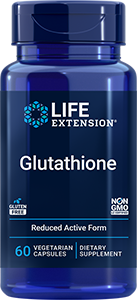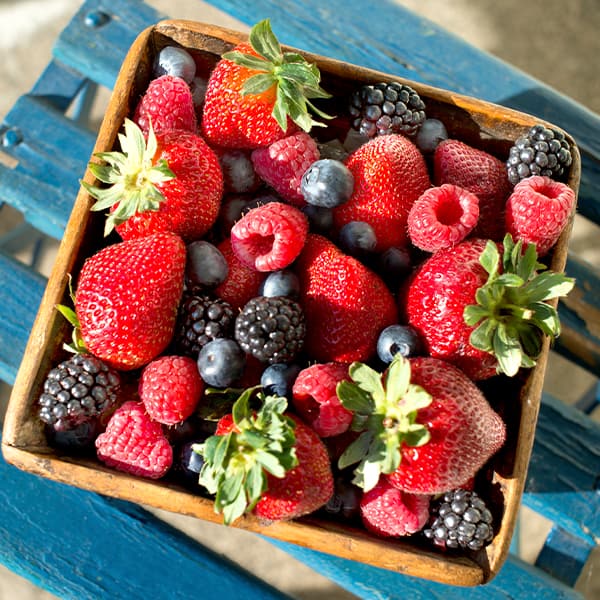
Best Antioxidant Supplements for Your Health
Published: December 2023
The word antioxidant is often thrown around in conversations about health and wellness, gaining a reputation for being a bit of a buzzword—and for good reason! These powerhouse nutrients do a lot for your health. But what exactly is an antioxidant and what do these nutrients do?
What are antioxidants?
If you're eating a healthy diet, you're likely getting some forms of antioxidants in your daily life. And they come with a whole wealth of health benefits. Before we get into the best sources, there are a few terms you should know:
- Free radicals—As a part of normal day-to-day life, the cells in our body produce oxygen-containing substances called free radicals that circulate in the body. Free radicals can occur as a result of stress or a high intensity workout, but other external sources of free radicals include cigarette smoke and pollutants from the environment.
- Oxidative stress—When the body produces too many free radicals, it causes oxidative stress, which can impact the body and its cells, including components like DNA, lipids and proteins.
This is where antioxidants come in. They act as a line of defense in your body to help keep free radicals in check and fight oxidative stress.
Antioxidants come in several forms—including enzymes, vitamins and minerals. Our bodies make some antioxidants we need, and many of them are even found in the foods we eat. And you can even get healthy antioxidants as dietary supplements.
Benefits of antioxidants
While antioxidants are primarily known for their roles in fighting free radicals and inhibiting oxidative stress, most wear several hats. These small but mighty compounds can support everything from heart health and brain health to even eye health and healthy aging—making supplementing a smart idea!
What are the 9 best antioxidant supplements?
Just like not all supplements are the same, that also rings true for antioxidants. They each play their own role in keeping you healthy for the long haul.
1. Glutathione
Glutathione is a naturally occurring antioxidant made up of the amino acids glycine, cysteine and glutamic acid. Glutathione in the body contributes to several biochemical reactions, including helping other antioxidants get back to their active forms so they can continue working as antioxidants, fighting free radicals and even playing a role in healthy detoxification.
2. Alpha-lipoic acid (ALA)
Alpha-lipoic acid is sometimes called the "universal antioxidant" due to its powerful antioxidant activity. It is both fat-soluble and water-soluble, making it easier to work throughout the whole body.
It plays a role in mitochondrial function and healthy cellular energy and helps protect against oxidative stress. While some supplements come in the "R" and "S" forms, look for supplements that contain the "R" form—this form is the kind of ALA native to the body and is more bioavailable.
3. Carotenoids
These yellow, orange and red plant pigments are some of the best antioxidant supplements you can find. Common carotenoids you might find in your diet include alpha-carotene, beta-carotene (a major source of vitamin A), lutein, zeaxanthin and lycopene.
On their own, each of these nutrients has big benefits. Lutein and zeaxanthin are important for eye health (particularly in the macula), lycopene supports heart and prostate health, and alpha and beta-carotene promote the immune system and healthy skin. And research has found that diets high in carotenoids have heart-healthy benefits, too. Although you're likely to find vitamin A in your multivitamin, most carotenoids can be found in standalone formulas for specific health needs.
Pro tip: If you think the name beta-carotene kind of sounds like the word carrot, it is not a coincidence! Carrots are one of the richest sources of beta-carotene, among other highly pigmented fruits and vegetables.
Explore Our Best Antioxidant Supplements
4. Vitamin C
Vitamin A isn't the only antioxidant supplement in the letter vitamin family! Vitamin C is an essential nutrient that is well-known for immune system support in addition to its antioxidant properties and ability to neutralize free radicals. But, because we can't make vitamin C on our own, it's necessary to get it either from the foods we eat or as a dietary supplement.
Vitamin C's health benefits also go beyond immune support and being a healthy antioxidant supplement. It also promotes collagen production, cardiovascular function and even a healthy inflammatory response. Vitamin C is sometimes combined with the flavonoid quercetin in an antioxidant-rich combination to complement vitamin C's benefits and make it more bioavailable.
5. N-acetyl-L-cysteine (NAC)
Like some of the other supplements on this list, NAC wears a lot of hats. This mighty antioxidant supplement encourages liver health, fights free radicals and even helps support cellular glutathione levels. In fact, one study found that in those who had lower glutathione levels, supplementing with N-acetyl-L-cysteine helped restore their levels to baseline.
6. Resveratrol
Resveratrol, a nutrient found in grapes, is another antioxidant supplement that also promotes healthy aging and heart and brain health. Although its health benefits are important, resveratrol is metabolized quickly in the body, which can be a roadblock for bioavailability and getting the most of its benefits.
Look for supplements that contain trans-resveratrol, the more active form of resveratrol, and fenugreek fibers to enhance the supplement's bioavailability.
Pro tip: Resveratrol is also sometimes combined with quercetin to support its healthy aging benefits and antioxidant potential.
7. Vitamin E
The antioxidant vitamins list continues! Vitamin E is a fat-soluble vitamin that is naturally found in eight different forms (called tocopherols and tocotrienols)—with the most well-known and primary form of vitamin E being alpha-tocopherol. Like vitamin C, vitamin E is exclusively obtained from the diet, and has major health benefits.
Vitamin E, particularly when you combine the tocopherol and tocotrienol forms, encourages cardiovascular health, nervous system function and retinal eye health, healthy cognitive function and even immune function.
8. EGCG from green tea extract
Green tea gets most of its free radical fighting benefits from something called polyphenols, in particular one called EGCG. Beyond being a healthy antioxidant supplement, green tea extract can support cell and metabolic health and a healthy heart.
Taking green tea as a supplement is good for two reasons: supplements usually provide higher polyphenols than drinking tea alone (some supplements offer the polyphenol equivalent of drinking three cups!), and extracts can supply healthy benefits both without caffeine and offer an alternative to those who don't like tea.
9. CoQ10
Coenzyme Q10, or CoQ10, is another antioxidant that the body produces naturally, but your levels can decrease with age, making supplementing important. Beyond its benefits for cardiovascular health and its role in cellular energy production, CoQ10 has strong antioxidant properties, including its ability to inhibit oxidative stress.
What Are Some of the Best Antioxidant Foods?
If you're eating a healthy diet, you're probably eating at least one or two antioxidant-rich foods. While there are some you likely know about (for example, lycopene is found in high concentrations in red foods like tomatoes, and citrus is high in vitamin C), you might be surprised to know they are also in a wide variety of other plant-based sources:
- Berries high in anthocyanins like raspberries and blueberries
- Dark leafy green vegetables
- Whole grains
- Russet and sweet potatoes
- Red beans and pinto beans
- Even flavonol-rich foods like dark chocolate!
So are some of these sources better than others? What's actually most important when it comes to antioxidants is variety. If you want to make sure you're getting enough of these foods (and a good rule of thumb for anyone prioritizing their nutrition), start by eating the rainbow! Putting colorful foods with major benefits first will ensure that you're getting enough healthy variety in your diet.
Not sure you're getting enough antioxidant-rich foods in your diet? To be fair, some antioxidants are harder to get from diet alone than others. Good news: almost all these foods are also available in extract form as supplements.
How to take antioxidant supplements
If you want to support your best health and up your antioxidant intake, supplements are a must (though you should always consult your doctor prior to introducing something new into your regimen). Seek out supplements that align with your goals and lifestyle (including a healthy diet and exercise regimen, adequate sleep and good habits) and promote your whole-body wellness to keep you at your healthiest.
References
- Ahn YJ, et al. "Lutein as a Modulator of Oxidative Stress-Mediated Inflammatory Diseases." Antioxidants. September 2021. https://www.ncbi.nlm.nih.gov/pmc/articles/PMC8470349/
- Chacko SM, et al. "Beneficial effects of green tea: A literature review." Chin Med. April 2010. https://www.ncbi.nlm.nih.gov/pmc/articles/PMC2855614/
- Dludla, PV, et al. "The impact of coenzyme Q10 on metabolic and cardiovascular disease profiles in diabetic patients: A systematic review and meta-analysis of randomized controlled trials." Endocrinol Diabetes Metab. March 2020. https://pubmed.ncbi.nlm.nih.gov/32318636/
- Imran M, et al. "Lycopene as a Natural Antioxidant Used to Prevent Human Health Disorders." Antioxidants. August 2020. https://www.ncbi.nlm.nih.gov/pmc/articles/PMC7464847/
- Kalt W, et al. "Recent Research on the Health Benefits of Blueberries and Their Anthocyanins." Adv Nutr. March 2020. https://www.ncbi.nlm.nih.gov/pmc/articles/PMC7442370/
- Paschalis V, et al. "N-acetylcysteine supplementation increases exercise performance and reduces oxidative stress only in individuals with low levels of glutathione." Free Radic Biol Med. February 2018. https://pubmed.ncbi.nlm.nih.gov/29233792/
- Reilly CT. "Top 20 Foods High in Antioxidants." https://www.stjohns.health/documents/content/top-20-foods-high-in-antioxidants.pdf
- Rizvi S, et al. "The Role of Vitamin E in Human Health and Some Diseases." Sultan Qaboos Univ Med J. May 2014. https://www.ncbi.nlm.nih.gov/pmc/articles/PMC3997530/
- Salehi B, et al. "Resveratrol: A Double-Edged Sword in Health Benefits." Biomedicines. September 2018. https://www.ncbi.nlm.nih.gov/pmc/articles/PMC6164842/
- "α-Carotene, β-Carotene, β-Cryptoxanthin, Lycopene, Lutein, and Zeaxanthin." Data on file.
- "Alpha-lipoic acid." Mount Sinai. https://www.mountsinai.org/health-library/supplement/alpha-lipoic-acid
- "Antioxidant Supplements: What You Need to Know." National Center for Complementary and Integrative Health. July 2023. https://www.nccih.nih.gov/health/antioxidant-supplements-what-you-need-to-know
- "Everything You Need to Know About Antioxidants." Cleveland Clinic. December 2021. https://health.clevelandclinic.org/what-do-antioxidants-do/
- "Resveratrol." Data on file.
- "Vitamin C." National Institutes of Health. March 2021. https://ods.od.nih.gov/factsheets/VitaminC-HealthProfessional/
Always be in the know!
Access the latest deals, wellness news, expert health tips & more!










